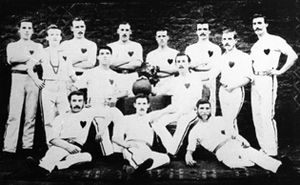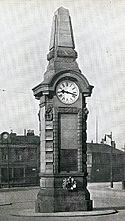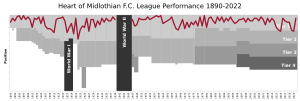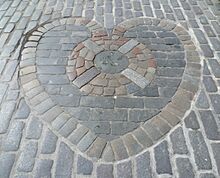Heart of Midlothian F.C. facts for kids
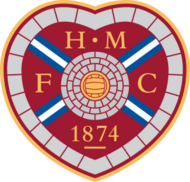 |
||||
| Full name | Heart of Midlothian Football Club | |||
|---|---|---|---|---|
| Nickname(s) | Hearts The Jam Tarts HMFC The Jambos The Gorgie Boys |
|||
| Founded | 1874 | |||
| Ground | Tynecastle Park, Edinburgh | |||
| Capacity | 17,480 | |||
| Chairperson | Ann Budge | |||
| Head coach | Derek McInnes | |||
| League | Scottish Premiership | |||
| 2015–16 | Scottish Premiership, 3rd | |||
|
||||
Heart of Midlothian Football Club, often called Hearts, is a professional football team in Edinburgh, Scotland. They play in the top league of Scottish football. Hearts is the oldest football club in Edinburgh, started in 1874. Its name comes from a famous book by Walter Scott called The Heart of Midlothian.
The club's badge looks like the Heart of Midlothian mosaic on Edinburgh's Royal Mile. The team's colours are maroon and white. Hearts' biggest rivals are Hibernian, and their games are known as the Edinburgh Derby.
Hearts has played their home games at Tynecastle Park since 1886. The stadium became all-seated in 1990. After a big rebuild in 2017, it can now hold over 20,000 fans. The team trains at the Oriam, which is Scotland's national sports centre. They also run their youth academy there.
Hearts has won the Scottish league championship four times. Their most recent win was in 1960. That year, they also won the Scottish League Cup. This made them the only club outside of the Old Firm (Celtic and Rangers) to win both the league and League Cup in the same season.
The club's most successful time was from the early 1950s to the mid-1960s. This was when former player Tommy Walker was the manager. During this period, Hearts won two league titles and five major cups. They also finished in the top four league positions for 11 years in a row. Famous players from this time included the "Terrible Trio" forwards: Jimmy Wardhaugh, Willie Bauld, and Alfie Conn Sr.. Other key players were Dave Mackay and John Cumming.
Hearts has won the Scottish Cup eight times. Their last win was in 2012, when they beat Hibernian 5–1. They have reached the final several times since then, but lost in 2019, 2020, and 2022. All four of Hearts' Scottish League Cup wins happened under manager Tommy Walker. The most recent was a 1–0 victory against Kilmarnock in 1962.
In 1958, Hearts became one of the first Scottish teams to play in European competitions. They reached the quarter-finals of the 1988–89 UEFA Cup in 1989. They lost to Bayern Munich by a score of 2–1 over two games.
Contents
Club History
How Hearts Started
Hearts was formed by a group of friends from a dance club called the Heart of Midlothian Quadrille Assembly Club. They started playing a mix of rugby and football rules. In 1874, they decided to play by the official "Association rules" of football. This is why 1874 is seen as the club's founding year.
The club's name came from the historic area of Midlothian. It also came from the Heart of Midlothian mosaic on the Royal Mile. This mosaic marks where the old Old Tolbooth jail used to be. The jail was also famous from Walter Scott's novel The Heart of Midlothian.
In 1875, Hearts joined the Scottish Football Association (SFA). This allowed them to play in the Scottish Cup for the first time. In 1885, Hearts faced a challenge. They were suspended by the SFA for two years. This was because they used two professional players, which was against the rules back then. The club was allowed back after changing its committee.
Early Wins
Hearts had a lot of success in the early days of the Scottish Football League. They won the league championship in 1895 and 1896. They also won four Scottish Cups between 1891 and 1906. Hearts even won the World Championship title in 1902. They beat Tottenham Hotspur 3–1 at Tynecastle Park.
Hearts and World War I
In November 1914, Hearts was leading the league. They had won their first eight games of the 1914–15 season. This was at the start of World War I. There was a debate about whether professional football should continue during the war.
Sixteen players from Hearts decided to join the army together. They enlisted on November 25, 1914. This group became part of the 16th Royal Scots battalion, known as the "footballer's battalion." Many Hearts fans and players from other clubs also joined.
The Hearts players trained for the army while still playing football. They had a great 20-game unbeaten run. But the hard army training made them tired. They started losing games, and Celtic ended up winning the league title.
Seven first-team players from Hearts lost their lives in the war. There are two war memorials to remember them. One is in France, and the other is in Haymarket, Edinburgh.
The Tommy Walker Era
After World War II, a new group of talented players joined Hearts. These included the "Terrible Trio" forwards: Willie Bauld, Jimmy Wardhaugh, and Alfie Conn Sr.. They scored over 900 goals for Hearts together.
In 1951, Tommy Walker became the manager. This was the most successful time in the club's history. Walker built a strong team with players like John Cumming and Dave Mackay. Mackay was a fantastic all-around player. Cumming was known as the "Iron Man" for his fearless play. He was never booked in his career.
In 1954, Hearts won their first trophy in 48 years. They beat Motherwell 4–2 in the 1954 Scottish League Cup final. Bauld scored three goals in that final.
Hearts continued to win. They won the 1955–56 Scottish Cup by beating Celtic 3–1. John Cumming played in that final even with a head injury. He famously said, "Blood doesn't show on a maroon jersey." This quote is now above the players' tunnel at Tynecastle.
In the 1957–58 season, Hearts won the league title. They set new records for points, goals scored (132), and goal difference (+103). This team is considered Hearts' greatest ever league side.
Hearts won the 1958 Scottish League Cup final in 1958, beating Partick Thistle 5–1. They won the league again in 1960, making it a double with the League Cup. Tommy Walker was even given an award for his services to football.
Hearts won the League Cup for a fourth time in 1962, beating Kilmarnock 1–0. In the 1964–65 season, Hearts almost won another league title. They needed a draw in their last game against Kilmarnock, but lost 2–0. This meant they lost the title by a tiny difference in goals.
Tommy Walker left in 1966. Under his leadership, Hearts won 7 major trophies.
Later 20th Century
After Walker left, Hearts had a tougher time. They reached the Scottish Cup Final in 1968 and 1976, but lost both times. In 1977, Hearts was relegated from the top league for the first time. For several years, they moved between the top and second divisions.
In 1981, Wallace Mercer became chairman. He helped Hearts get back to the top league. The 1985–86 season was one of their best since 1965. Hearts went 27 games without losing in the league. They were leading the league going into the last game. They needed a draw against Dundee to win the title. However, they lost 2–0, and Celtic won the league instead. Hearts also lost the Scottish Cup Final that year.
Hearts finished second in the league again in 1988 and 1992. In 1989, they reached the quarter-finals of the 1988–89 UEFA Cup.
In 1998, Hearts won the Scottish Cup again. They beat Rangers 2–1 under manager Jim Jefferies. This was their first major trophy since 1963.
Into the 21st Century
Hearts played in the UEFA Cup group stages in 2004–05. In 2004, the club's CEO, Chris Robinson, wanted to sell Tynecastle Park and have Hearts rent Murrayfield Stadium. Fans were very unhappy about this plan.
The Romanov Era
In 2004, Vladimir Romanov, a wealthy businessman, started talks to take over Hearts. He promised to keep the club at Tynecastle. This made him popular with fans. Romanov slowly bought more shares and gained control of the club.
Romanov's time at Hearts was a bit rocky. The club often had money problems and sometimes struggled to pay players' wages on time. Romanov changed managers very often, with nine different managers in seven years.
In 2011, the club faced serious financial issues. They were unable to pay players' wages. In 2013, Hearts announced they were going into administration because of large debts. This meant the club was managed by administrators to try and save it. They were also given a penalty of -15 points for the next season.
Hearts fans stepped up to help. They bought many season tickets to raise money. Several groups tried to buy the club. "The Foundation of Hearts," a group of supporters, was chosen as the preferred bidder. They raised money through monthly donations from fans.
On May 12, 2014, a group led by Ann Budge took control of Hearts. This ended Romanov's involvement. Budge became the club's unpaid chairperson. The Foundation of Hearts also provided a lot of money to help the club. Hearts officially left administration on June 11, 2014. This also ended the ban on signing new players.
After Administration
Hearts quickly returned to the Scottish Premiership. They won the 2014–15 Scottish Championship title in 2015 with seven games left. They had a great season, winning 29 out of 36 games and scoring 96 goals. They finished 21 points ahead of their rivals, Hibernian.
After this success, the club had some ups and downs. They finished in the middle of the league table for a few years. In the 2019–20 season, Hearts finished last in the Scottish Premiership and were relegated again. This happened because the season was cut short due to the COVID-19 pandemic. Hearts tried to fight the relegation legally, but they were unsuccessful.
Robbie Neilson became Hearts manager for a second time in June 2020. In August 2021, Ann Budge officially gave control of the club to the Foundation of Hearts. This made Hearts the biggest fan-owned club in the United Kingdom.
Hearts won the Scottish Championship in 2021, returning to the top league. In their first season back, 2021–22, they finished third. This earned them a spot in European football, specifically the UEFA Conference League. They finished fourth in 2022–23 and third in 2023–24, securing European football again. However, after a difficult start to the 2024–25 season, manager Steven Naismith was replaced by Derek McInnes in October 2024.
Team Colours and Badge
Hearts' first football kit was all white shirts and trousers with maroon details. They also had a heart sewn onto the chest. For one season, they played in red, white, and blue stripes. Since then, their main colours have been maroon and white. The home kit usually has a maroon top with a white collar, white shorts, and maroon socks.
The club's badge is a heart. It is based on the Heart of Midlothian mosaic on the Royal Mile in Edinburgh. There is an old tradition to spit on this mosaic when you pass it. This goes back to when the city jail stood there.
For the 2014–15 season, the club wore a special kit. It was to remember 100 years since McCrae's Battalion was formed during World War I. The home shirt had no sponsor as a sign of respect.
Home Stadium
Hearts played at a few different places before moving to the Gorgie area in 1881. In 1886, they moved to their current home, Tynecastle Park. The stadium is named after the Tynecastle Tollhouse nearby.
Tynecastle was mostly a standing-room stadium for many years. A main seated stand was built in 1919. In the 1990s, the standing areas were replaced with seats. This made Tynecastle an all-seated stadium. In 2017, the main stand was rebuilt, increasing the stadium's capacity to over 20,000. While the work was happening, Hearts played some games at Murrayfield Stadium.
Local Rivalry
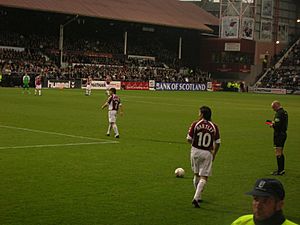
Hearts has a strong local rivalry with Hibs in Edinburgh. Their matches, called the Edinburgh derby, are some of the oldest football rivalries in the world. The two clubs first played each other on Christmas Day in 1875. Hearts won that first game 1–0.
Hearts has a better record in these derby matches. They have met twice in a Scottish Cup Final. Hearts won both times, 3–1 in 1896 and 5–1 in 2012. The 1896 final was special because it was the only Scottish Cup Final ever played outside Glasgow.
While some rivalries have religious or political reasons, the Edinburgh derby is mostly about geography. Hearts fans usually come from the west and south of Edinburgh. Hibs fans are mostly from Leith and the north and east of the city. Even though they are big rivals, the competition is usually friendly.
Fans and Club Culture
Hearts is one of two professional football clubs in Edinburgh. Many fans attend their games. Important matches, like the Edinburgh derby or European games, often fill Tynecastle Park.
Club Songs
"The Hearts Song" is a well-known song for the club. It was written by Scottish comedian Hector Nicol. Another popular song is "There Will Always Be Heart of Midlothian" by Neil Grant. This song is often played at Tynecastle Park.
In Popular Culture
Many famous people are Hearts fans. These include snooker player Stephen Hendry, comedian Ronnie Corbett, and actor Ken Stott.
Hearts has also appeared in popular culture:
- In the video game Grand Theft Auto: San Andreas, two rival gangs wear green and maroon. Fans think this is a nod to Hearts and Hibernian, as the game's creators are based in Edinburgh.
- The TV show Succession featured Hearts in a storyline. A character buys the team to impress his father, only to find out his father supports Hibernian.
- In the 2022 film Aftersun, a character wears a Hearts shirt from the 1998–99 season.
Player of the Year
- 2012–13
 Marius Žaliūkas
Marius Žaliūkas - 2013–14
 Jamie MacDonald
Jamie MacDonald - 2014–15
 Jamie Walker
Jamie Walker - 2015–16
 Arnaud Djoum
Arnaud Djoum - 2016–17
 Jamie Walker
Jamie Walker - 2017–18
 Christophe Berra
Christophe Berra - 2018–19
 Steven Naismith
Steven Naismith - 2020–21
 Craig Gordon
Craig Gordon - 2021–22
 Craig Gordon
Craig Gordon - 2022–23
 Lawrence Shankland
Lawrence Shankland - 2023–24
 Lawrence Shankland
Lawrence Shankland - 2024–25
 James Penrice
James Penrice
European Football Record
Hearts has played in European competitions several times. Their current UEFA ranking is 138th.
Club Honours
Hearts has won many trophies throughout its history.
Major Trophies
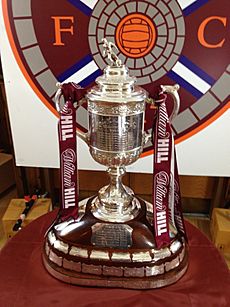
- Scottish Premiership (Top League):
- Champions (4): 1894–95, 1896–97, 1957–58, 1959–60
- Runners–up (14): 1893–94, 1898–99, 1903–04, 1905–06, 1914–15, 1937–38, 1953–54, 1956–57, 1958–59, 1964–65, 1985–86, 1987–88, 1991–92, 2005–06
- Scottish Cup:
- Winners (8): 1890–91, 1895–96, 1900–01, 1905–06, 1955–56, 1997–98, 2005–06, 2011–12
- Runners–up (9): 1902–03, 1906–07, 1967–68, 1975–76, 1985–86, 1995–96, 2018–19, 2019–20, 2021–22
- Scottish League Cup:
- Winners (4): 1954–55, 1958–59, 1959–60, 1962–63
- Runners–up (3): 1961–62, 1996–97, 2012–13
Other Trophies
- Scottish Championship (Second Tier):
- Winners (3): 1979–80, 2014–15, 2020–21
- Football World Championship:
- Winners: 1902
- Runners–up: 1895
Club Records
- Highest home attendance: 53,396 fans against Rangers in the Scottish Cup, February 13, 1932, at Tynecastle.
- Biggest win: 21–0 against Anchor in the EFA Cup, 1880.
- Biggest defeat: 1–8 against Vale of Leven in the Scottish Cup, 1888.
- Most games played: Gary Mackay, 640 games (1980–1997).
- Most goals in the league: John Robertson, 214 goals (1983–1998).
- Most goals in one season: Barney Battles Jr., 44 goals in 1930–31.
- Youngest player: Scott Robinson made his debut at 16 years, 1 month, and 14 days old.
- Highest transfer fee paid: £850,000 for Mirsad Bešlija from Racing Genk in 2006.
- Highest transfer fee received: £9 million for Craig Gordon from Sunderland in 2007. This was a British record for a goalkeeper at the time.
Players
Current Squad
|
|
Players on Loan
|
Retired Numbers
|
Club Staff
Corporate Staff
| Position | Name |
|---|---|
| Chairman | Ann Budge |
| Chief executive | Andrew McKinlay |
| Non executive director | James Anderson |
| Non executive director | James Franks |
| Non executive director | Claire Hammond |
| Non executive director | Kevin Windram |
| Finance director | Euan Forbes |
| Marketing & commercial director | Catriona McCallum |
| Sporting director | Graeme Jones |
| Head of recruitment | William Lancefield |
| Principal ambassador | Gary Locke |
| Foundation of Hearts chairman | Gerry Mallon |
| Central services director | Lesley Blair |
Coaching Staff
| Position | Name |
|---|---|
| Head coach | Derek McInnes |
| First team coaches | Paul Sheerin Alan Archibald |
| Goalkeeping coach | Paul Gallacher |
| Technical development manager | Shelley Kerr |
| Academy director | Andy Webster |
| Head of academy coaching | Laurie Ellis |
| B team head coach | Angus Beith |
| Set piece coach | Ross Grant |
| Heads of performance | Bob McCunn |
| Performance analysts | Euan Blondin Tom White |
| Physiotherapists | Craig Maitland Claire Rankin |
| Sports scientist | Mike Williams |
Managers of Hearts
- Peter Fairley (1901–1903)
- William Waugh (1903–1908)
- James McGhee (1908–1909)
- John McCartney (1910–1919)
- Willie McCartney (1919–1935)
- David Pratt (1935–1937)
- Frank Moss (1937–1940)
- David McLean (1941–1951)
- Tommy Walker (1951–1966)
- John Harvey (1966–1970)
- Bobby Seith (1970–1974)
- John Hagart (1974–1977)
- Willie Ormond (1977–1980)
- Bobby Moncur (1980–1981)
- Tony Ford (1981)
- Alex MacDonald (1982–1986)
- Sandy Jardine and Alex MacDonald (1986–1988)
- Alex MacDonald (1988–1990)
- Joe Jordan (1990–1993)
- Sandy Clark (1993–1994)
- Tommy McLean (1994–1995)
- Jim Jefferies (1995–2000)
- Craig Levein (2000–2004)
- John Robertson (2004–2005)
- George Burley (2005)
- Graham Rix (2005–2006)
- Valdas Ivanauskas (2006–2007)
- Anatoliy Korobochka (2007–2008)
- Stephen Frail (2008)
- Csaba Laszlo (2008–2010)
- Jim Jefferies (2010–2011)
- Paulo Sérgio (2011–2012)
- John McGlynn (2012–2013)
- Gary Locke (2013–2014)
- Robbie Neilson (2014–2016)
- Ian Cathro (2016–2017)
- Craig Levein (2017–2019)
- Daniel Stendel (2019–2020)
- Robbie Neilson (2020–2023)
- Steven Naismith (2023–2024)
- Neil Critchley (2024–2025)
- Derek McInnes (2025–)
Hearts Women's Team
In 2009, Hearts took over Musselburgh Windsor Ladies Football Club. They changed its name to Hearts Ladies FC. Now, they play in the Scottish Women's Premier League as Hearts Women.
The women's team plays their home games at The Oriam in Riccarton.
See also
 In Spanish: Heart of Midlothian Football Club para niños
In Spanish: Heart of Midlothian Football Club para niños


